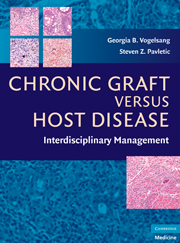Book contents
- Frontmatter
- Contents
- List of Contributors
- Preface
- PART I GENERAL PRINCIPLES
- PART II CLINICAL MANAGEMENT
- PART III ORGAN SITE OR SYSTEM-SPECIFIC MANIFESTATIONS
- PART IV SPECIAL CONSIDERATIONS IN CHRONIC GVHD
- 31 Design of Clinical Trials Testing Treatment for Chronic Graft versus Host Disease
- 32 Spectrum of Chronic Graft versus Host Disease in Unique Clinical Situations: The Role of Stem-Cell Source Including Cord Blood Stem Cells, Reduced-Intensity Conditioning, and Donor Leukocyte Infusions
- 33 Pediatric Chronic Graft versus Host Disease
- 34 Principles of Interdisciplinary Practice in the Care of Patients with Chronic Graft versus Host Disease
- 35 Patient Advocacy, Education and Psychosocial Support
- 36 Future Directions
- Index
- Plate section
31 - Design of Clinical Trials Testing Treatment for Chronic Graft versus Host Disease
from PART IV - SPECIAL CONSIDERATIONS IN CHRONIC GVHD
Published online by Cambridge University Press: 26 August 2009
- Frontmatter
- Contents
- List of Contributors
- Preface
- PART I GENERAL PRINCIPLES
- PART II CLINICAL MANAGEMENT
- PART III ORGAN SITE OR SYSTEM-SPECIFIC MANIFESTATIONS
- PART IV SPECIAL CONSIDERATIONS IN CHRONIC GVHD
- 31 Design of Clinical Trials Testing Treatment for Chronic Graft versus Host Disease
- 32 Spectrum of Chronic Graft versus Host Disease in Unique Clinical Situations: The Role of Stem-Cell Source Including Cord Blood Stem Cells, Reduced-Intensity Conditioning, and Donor Leukocyte Infusions
- 33 Pediatric Chronic Graft versus Host Disease
- 34 Principles of Interdisciplinary Practice in the Care of Patients with Chronic Graft versus Host Disease
- 35 Patient Advocacy, Education and Psychosocial Support
- 36 Future Directions
- Index
- Plate section
Summary
INTRODUCTION
Approximately 4,000 patients have allogeneic hematopoietic cell transplantation (HCT) annually throughout the world, and 40% to 60% of those who survive beyond the first 3 months develop chronic graft versus host disease (GVHD). Even though nearly 1,500 people develop chronic GVHD each year, no drugs have been approved for its treatment. New therapies are needed, since chronic GVHD has major adverse effects on long-term morbidity and late nonrelapse mortality after allogeneic HCT. The complexity of chronic GVHD, however, has made it difficult to design, conduct, and analyze clinical trials involving these patients, even when promising treatment options are available.
The National Institutes of Health Consensus Development Project on Criteria for Clinical Trials in Chronic Graft-Versus-Host Disease clarified organized and codified a number of issues in this disease that are vital for successful drug development, and material in this chapter draws heavily from those recommendations. For design of a successful clinical trial in this complex disorder, three critically important questions must be considered (1) who will be enrolled in the trial, (2) how will subjects be treated, and (3) how will results be evaluated? The following sections address the selection of participants, treatment methods, data collection, primary and secondary endpoints, biostatistical considerations, and overall assessment of safety and efficacy, as applied to clinical trials of treatments for chronic GVHD.
SELECTION OF PARTICIPANTS
General Considerations
The prestudy evaluation is critical to defining the patient population of the clinical trial.
- Type
- Chapter
- Information
- Chronic Graft Versus Host DiseaseInterdisciplinary Management, pp. 351 - 359Publisher: Cambridge University PressPrint publication year: 2009



